When someone else uses your physical credit card or your account information to make purchases or withdraw cash without your permission, it means you're the victim of credit card theft. Though you might think this is the type of thing that happens to other people and not you, credit card fraud is actually one of the most common types of identity theft.
Whether someone got your card information through a skimmer, a phishing scam, malware, or other means, or they physically stole your card, you might be wondering whether the police will be of any help. When the theft is a smaller amount, such as under $500, you might wonder if it's worth filing a report at all.
 The answer is: it depends. It is a good idea to file a police report when you are the victim of credit card fraud, no matter the amount. Whether police will investigate credit card theft under $500 will depend on the specifics of the crime and your location.
The answer is: it depends. It is a good idea to file a police report when you are the victim of credit card fraud, no matter the amount. Whether police will investigate credit card theft under $500 will depend on the specifics of the crime and your location.In this article, we'll take a look at what you need to know about how law enforcement agencies respond to credit card fraud and identity theft.
Whether police will investigate credit card theft of any kind is going to depend on whether you file a police report, the specific policies of the particular police department, and more.
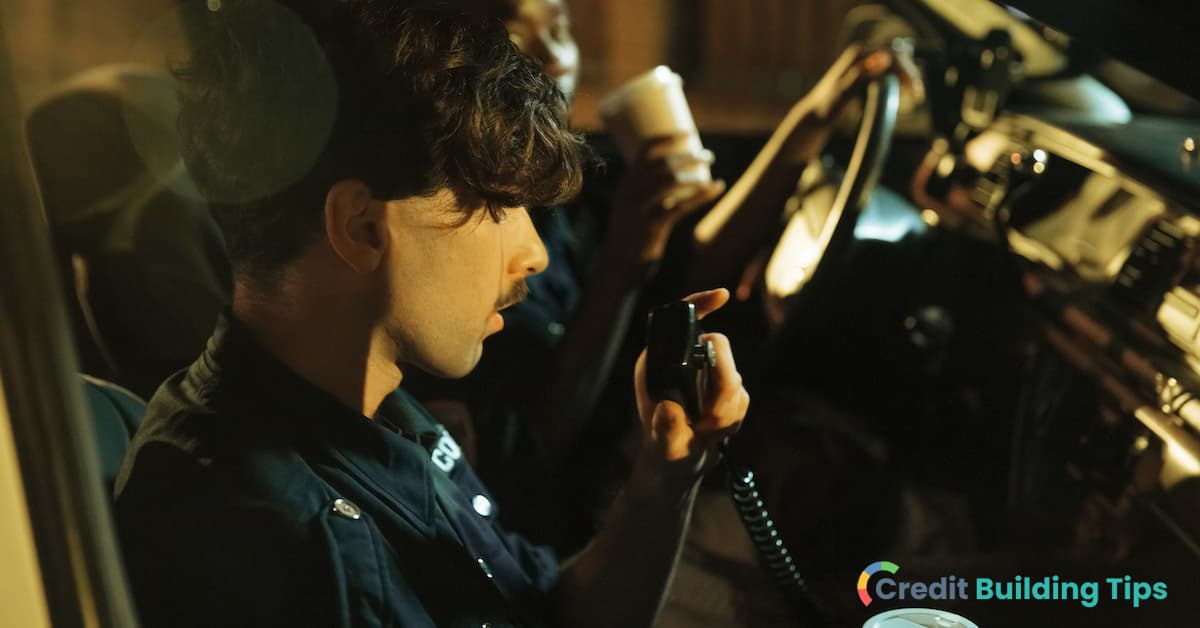
This means that there really isn't a one-size-fits-all answer to this question.
In general, police departments will typically investigate credit card theft cases regardless of how much money is involved. That being said, local laws and department priorities can impact the threshold for initiating an investigation.
Even though you might assume that the police might not care about a small amount of credit card theft, the truth is that these types of crimes typically lead to further fraudulent activities. Therefore, it's common for law enforcement agencies to take credit card theft seriously.
One of the things that makes it impossible to say definitively whether a police department will investigate credit card theft of any amount is the inherent jurisdictional issues involved.
If your credit card was physically stolen from you, that's one thing. It is then clearly a local crime. However, things get more complicated if your card information was stolen online or you have no idea how the thief got a hold of it.
Has your credit report seen better days? To learn how to remove negative information from your report, check out our guides to removing late payments, charge offs, collections, and hard inquiries.
Suppose someone else has obtained and used your personal or financial information without your permission. In that case, you will generally want to contact your local police department or sheriff's office in order to file a police report.

The FDIC recommends that you call the local police when you discover unauthorized credit card charges in addition to notifying the:
Filing a police report can help you during the process of contesting the charges with your credit card company. This can be another piece of evidence you can show them to prove that you didn't make the charges yourself.
Having a police report on file can also be useful if the fraudster ends up committing further identity theft using your information. No matter how small an initial theft is, a far bigger problem can be indicated by minor crimes like credit card theft under $500.
At the end of the day, law enforcement agencies will only know that the crime occurred if you file a report with them. Of course, noticing unauthorized charges on your credit card doesn't call for using emergency 911 lines-- it's best to use the business number for your local police.
Even if there's a slim chance that the police will pursue your case, there are some good reasons to still file a police report for identity theft.
Filing a police report for identity theft is a way to declare your own innocence and provide a sworn statement that you aren't responsible for purchases or crimes committed in your name.
This is essentially a way to create an official document that states that your credit card information has been stolen and you aren't responsible for any crimes or purchases that the criminal made using your identity.
Filing a police report can also be a useful action in order to help you dispute fraudulent charges. In many, but not all, cases, recovering from credit card fraud is more about cleaning up the damage and protecting yourself rather than actually catching the perpetrator.
Unfortunately, the reality is that you can find a great deal of variation in terms of how helpful any given police department is.
If this is the response you get, the officer or individual that you're speaking with is not necessarily trying to shirk responsibility. There just can sometimes be confusion in terms of whether this is an issue that involves police.
Another issue you might run into in some areas is that officers can, in some places, view credit card fraud as a somewhat victimless crime. This is, according to some experts, much more common in places where there's a lot of violent crimes.
If you try to contact the police department and they tell you it isn't necessary to file a report, it's a good idea to persist in your efforts. All this being said as credit card fraud has become more common, law enforcement offices have started to take it more seriously.
The processes that different police departments use can vary quite a bit. Generally, though, after you file a report the case will be reviewed by a detective. At that point, they'll decide what the next steps are or if they're going to take any at all.
If it is a case that could be actively investigated and solved, they'll be much more likely to follow through and pursue it. Their overall caseload, however, can impact how aggressively they act.
Cases are typically ranked based on how much data is available. The more information there is, such as if the suspect is known, the more likely it will be pursued. In big cities where there are commonly more serious offenses taking place, credit card fraud can end up falling to the bottom of the pile.
Unfortunately, some criminals are smart enough to know the laws in their area in terms of what makes credit card fraud a felony. Though laws can vary quite a bit, some states will have a dollar amount that makes credit card fraud a felony versus a misdemeanor.
For example:
Beyond that, credit card fraud can sometimes be a federal crime if it affects interstate or foreign commerce. If this occurs, the crime is a felony and can carry much more severe penalties than at the state level. For example, if a perpetrator were caught and prosecuted for using a credit card fraudulently, they could face up to two decades in prison.
Whether or not credit card fraud under $500 is a felony depends on your state. Check out our guide to credit card fraud laws to learn more.
You can file a police report if you believe you are a credit card fraud victim. This can be a good idea in order to create a sworn statement that you are innocent of any crimes committed in your name and that you didn't make the purchases made using your card.
If you are skeptical of going through the trouble of filing a police report, you might feel a bit more compelled to do so if any of the following are true:
Whether someone has your physical credit card in their possession or you've noticed suspicious charges on your account, there are a few steps you'll want to take once you've decided to file a police report.
When you go to your local police department, they'll often ask for your FTC report. You can save an extra trip by doing this ahead of time and bringing it with you.
You can use the online tool at IdentityTheft.gov to file a report. You'll need to prove your identity by including personal information. Everything you enter will become a part of a secure online database, and you have some choice regarding how much personal info you enter.
Once you've finished, print out the report and keep a copy for yourself. If you'd rather file your report over the phone, you can use their hotline at 1-877-FTC-HELP.
In addition to your FTC report, you'll also want to bring your ID in order to prove that you are who you say you are.
It's a good idea to bring the following along with you to the police station:
Bring credit card statements or any other evidence you have to show that you're the victim of credit card fraud.
If you had any interaction with the scammer, for example, if you fell victim to a phishing scheme, bring printouts of any communication you had with them as well.
Depending on where you are, you might find that the individuals you interact with at the police department seem disinterested in your case. They even might try to hurry you through filing your report.
This can be frustrating, but these cases can garner this type of reaction because identity theft and credit card fraud cases can be very difficult to prosecute in some cases. Another potential explanation is that they have a lot of other cases, including those that involve violent crimes and perceive ID theft and credit card fraud as less pressing.
Despite this, you will want to be persistent. At the same time, it's important to stay calm. Try not to get frustrated or overwhelmed, and clearly state the chain of events as you know them. You will want to show them the evidence you've gathered and ask for a copy of your police report.
Unfortunately, there can be a lot of paperwork when it comes to recovering from credit card fraud and identity theft. You will help make the process a lot easier for yourself by keeping detailed notes, including the names of the police officers that took your report and the day you filed your report.
Keep a file with all relevant documents regarding your credit card fraud. Your credit card issuer or other financial institutions might want to see your police report when you're disputing fraudulent purchases, so make sure you hold on to it.
You can ask the police officers what the next steps are in the case. Depending on the specifics of your situation, they might tell you there's not much they can do. Regardless, you can ask them when a good time to follow up would be if you don't hear anything.
Before I sign off, let's take a look at some common related questions having to do with credit card theft.
Credit card fraud is considered a form of identity theft. This is because the person who steals the card or card information is pretending that they are the account holder when they make a purchase or other action.
There are two primary ways that thieves will commit credit card fraud. These are:
When it comes to credit card application fraud, fraudsters can create a fake identity by combining a real person's personal information with fake information, actually steal someone else's identity entirely, or convince someone to add them as an authorized user to make fraudulent purchases.
If you are able to identify the person that stole your credit card, then it is definitively a local matter that the police will be more likely to follow through with.
On the other hand, if someone stole your credit card information digitally and it's unclear who they are or where they are, police will be less likely to investigate. At that point, it's unclear whether it's even a local matter. That being said, filing a police report can still be a good idea to create a paper trail.
Unfortunately, many victims are unwilling to identify the person who stole their credit card, particularly when it is a loved one. In these cases, it's common for drug addiction to be the reason for the theft. The police department could, in such a case, say that it's a family matter and perhaps encourage the individual to cancel their card.
Whether or not police will actively investigate credit card theft under $500 will depend on a number of factors. That being said, filing a police report can be a good idea, even if you are pretty sure they won't follow up.
This can:
When it comes to credit card theft and fraud, prevention is the best cure. Taking steps to protect your financial information online can help protect you from malicious individuals that want to take over your credit card accounts or open new accounts in your name.
At the same time, there is always only so much you can do to protect your information. If you've been the victim of credit card fraud, you'll want to turn your attention toward reducing the damage and repairing your credit.
For more information about improving your credit, make sure you check out our Credit Building Tips blog.
CreditWise from Capital One is one of the most popular free credit monitoring services out there. Is CreditWise accurate, though?
When you're keeping track of your credit score, it makes sense for accuracy to be one of your biggest concerns. After all, you want to know that you're looking at the same credit score a potential lender is seeing.
 The truth is, though, that each individual has a number of different credit scores. CreditWise allows you to monitor your VantageScore 3.0 calculated from your TransUnion credit report.
The truth is, though, that each individual has a number of different credit scores. CreditWise allows you to monitor your VantageScore 3.0 calculated from your TransUnion credit report.Given this, is CreditWise worth using compared to the other options on the market? Let's take a look at what you should know.
CreditWise is a credit monitoring service that is offered by Capital One, one of the largest financial institutions in the United States.
When you think of Capital One, you probably associate the company with being a credit card issuer, but they also provide a wide variety of other banking services, including:
Both customers and non-customers of Capital One can use the CreditWise credit monitoring service.
While there are a number of different credit monitoring services out there that customers can use to monitor their scores and work to improve their scores, CreditWise is one of the free options on the market.
When you use CreditWise, you can:
There are two primary reasons why you might want to sign up for a credit monitoring service.
These are:
If the wrong person gets a hold of your personal and financial information, it can wreak havoc on your credit profile and have a number of other deleterious effects.

Fraudsters can open up new accounts in your name or rack up charges on your existing credit cards. With the right credit monitoring services, you can be notified anytime there are changes to your credit report.
When you're the victim of identity theft, it can be a real bear to undo the damage. The sooner you are able to recognize that something fishy is going on, the less harm the thieves will be able to do.
Beyond helping protect you from the damaging effects of identity theft, credit monitoring services can also be useful if you are working to improve your credit score.
Signing up for credit monitoring services can help you track credit growth over time. When you sign up, it only counts as a soft inquiry, which means that it won't negatively impact your credit score.
For example, maybe you've decided that you're going to purchase a home in the next few years. It can be wise to start paying attention to your credit score sooner rather than later. This way, you can ensure that your score is where you want it to be when lenders look over your application.
There are a number of different services that credit monitoring services might offer, including:

CreditWise is a tool that lets you monitor your VantageScore 3.0 credit score.
There are two primary credit scoring models: FICO and VantageScore. Each of these credit scoring companies have released different versions over the years. CreditWise gives you access to your VantageScore 3.0.
You can access CreditWise from both your laptop or desktop as well as from your phone. Looking at your credit score on CreditWise won't ding your score.
This service is free regardless of whether you're a Capital One customer or not.
There are a number of features that Capital One CreditWise offers to help you keep track of your credit score and even work to improve it:
If you're looking to stay on top of your credit score, CreditWise is a free resource available to everyone.
With any service like this, though, there are going to be pros and cons.
On the plus side, CreditWise lets you:
On the other hand, some of the cons of CreditWise are:
When you use the CreditWise credit monitoring service offered by Capital One, you're receiving your VantageScore 3.0 calculated using your TransUnion credit report.
Each individual usually has multiple credit scores. There can be variations between scores depending on the credit bureaus, scoring models, and industry-specific needs of a lender.
So, is CreditWise accurate?
The answer is:
Credit monitoring services can be useful tools to help you monitor your financial health. At the same time, each of them will use certain credit bureaus and credit scoring models, meaning that there will likely be variations between scores depending on which service you use.
That being said, it's possible that the credit score you see will be slightly different than the score a potential lender will be looking at. Let's look closely at why you probably have several different credit scores and what this means.
When we talk about credit scores, we often discuss them as if each individual has one set credit score. The truth is, though, most people will have multiple credit scores.
Because there are a number of different credit scoring models and three major credit bureaus, most individuals don't just have one score.
Here are some of the key factors that influence your different credit scores and can explain slight variations between them:
When you combine all of these factors, each individual can end up with quite a few different credit scores. If you're applying for a loan or line of credit, the score that a particular lender will use can depend on the purpose of the evaluation, preferences, and industry standards.
There are lots of different credit monitoring services out there. CreditWise is only one of the options on the table.
Some other free services that are well-regarded for reliability and accuracy include:
Some paid services that are well-regarded for reliability and accuracy include:
For more information about other popular credit monitoring services, check out our post on Rocket Money and our guide to Credit Karma and Experian.
Experts say that you should check your credit report and score at least once a year. However, checking in more frequently with your credit score can help you catch potential signs of credit card fraud or identity theft. It can also help you prepare for big financial decisions, such as taking out an auto loan or a mortgage.
This service uses your TransUnion credit report to calculate a VantageScore 3.0. Since you have different credit reports and different credit scoring models, you probably have several different credit scores that might vary a bit.
That being said, using CreditWise or another credit monitoring service can be a great way to check in with your general financial health.
Have you realized it's time to build or improve your credit? Starting early before you expect a lender to check your credit can help you access broader financial opportunities down the road. Make sure you check out our Credit Building Tips blog for more valuable resources!
Are you hunting for a new place and you're wondering which credit score apartments look at when you apply?
The notion that landlords and property managers will run a credit check before renting an apartment to you can seem a bit mysterious. How do they get your credit scores? What information do they scrutinize?
 Every landlord and property manager will have their own criteria they judge applicants by. Some might not check your credit at all, while others might run full credit checks and background checks.
Every landlord and property manager will have their own criteria they judge applicants by. Some might not check your credit at all, while others might run full credit checks and background checks.There are a number of services that can be used to obtain a prospective tenant's credit report. Depending on how a landlord gets this information, it will impact which credit bureau your info is being pulled from and what credit scoring model is used.
When you're looking for a new apartment, you'll likely find that potential landlords want to run a "credit check." Since it is a common practice for landlords or property managers to check your credit, your credit file can have a big impact on your apartment search.

The term "credit check" can ultimately mean a number of different things. For example, some landlords might just check your credit score and verify your identity. Others might pull your credit, run a background check, and even look at county records, social media, and bank statements.
Some of the ways a landlord or property manager might check your credit include:
Landlords can sometimes obtain tenant credit reports using organizations like the National Association of Independent Landlords.
The credit check might be a hard inquiry, depending on the particular association they are getting the report from. Hard inquiries (also known as "hard pulls") can make your credit score go down a bit for a brief period of time.
There are a number of different tenant screening services out there, some of which offer credit reports for property managers and landlords.
Some common types of info access through these services include:
Some services might simply allow landlords to enter a desired range for credit scores and then see whether or not a potential applicant qualifies based on the parameters they set.
There are also a number of credit screening products available through the three major credit bureaus-- Equifax, Experian, and TransUnion.
These inquiries are often only considered soft inquiries. This means that it won't have an impact on your credit score and won't even be visible to anyone other than you on your credit report.
In some cases, you might have to initiate the credit check as the renter.
The answer to this question is-- it depends.
The credit report that is used to calculate your credit score when you are applying to an apartment is going to depend on a number of factors.

When you request your credit reports from the three major credit reporting agencies-- Transunion, Equifax, and Experian-- usually, there won't be a credit score on the document.
However, you can typically purchase your credit score from the credit bureaus or access a free credit score through:
There are two primary credit scoring models, which are:
The fact that different credit scoring models can be used in combination with different credit reports actually means that you have several credit scores.
Whether a landlord association will offer your FICO or VantageScore will depend on their standard practices. Beyond that, which credit report they pull your information from can depend as well.
There are a number of different tenant screening services out there, including:
Which credit score your prospective landlord sees will depend on the practices of the service. That being said, FICO scores are more commonly used by landlords than the VantageScore model.
If your landlord is using Equifax to check your credit, they'll see a FICO score. If they use Experian, they'll see a VantageScore. Through TransUnion's services, they'll access a score known as the ResidentScore, specifically designed to predict the likelihood of evictions for a tenant.
Landlords might check one of your credit scores, or they might do a more thorough dive into your credit report and other aspects of your financial history.
Some smaller landlords might not even check your credit score, but this is less and less common.
Typically, landlords know that actually looking at the details of a credit report is more useful than just looking at a credit score. A person's credit score can be severely damaged by identity theft or an outrageous medical bill, for example, even if they have otherwise been a responsible borrower.
When a landlord does choose to look at a credit report, they'll likely look at the following:
The credit score you'll need to be approved for an apartment is going to depend on the particular landlord or property manager. Every apartment complex or landlord is going to have their own rubric for evaluating whether a tenant is a good candidate for an apartment.
Though there is no set credit score minimum for renting an apartment, many landlords will look for a score of at least 600.
That being said, you'll typically find that most landlords and property managers will want you to have a credit score above 600.
Both FICO scores and VantageScores range from 300 to 850. The higher your credit score, the more appealing you appear as a renter because it shows you've managed your finances responsibly. Lower credit scores, on the other hand, can indicate that you might have a hard time paying your full rent on time every time.
Finding an apartment can be incredibly stressful regardless of your credit score. When you're credits seen better days, the whole search can feel particularly disheartening. Let's take a look at some of the most common questions about credit scores and renting an apartment.
The more information you have, the better prepared you'll be during the application process.
Reviewing the credit history of a prospective tenant is common practice for many landlords. However, that doesn't mean that all of them will check your credit score or pull your credit report when you are applying for apartments.
In addition to (or in lieu of) credit scores and credit reports, they might look to other factors to make a decision, including:
Of course, every landlord is going to be different. However, if you're worried about your credit it's worth understanding, in general, which types of landlords are more or less likely to check your credit.
For example, you're much more likely to have your credit checked if you're applying for a place through one of the following:
If you have bad credit or no credit, you might be wondering where you can apply where your credit won't be a problem.
While it's hard to generalize, you might want to look into the following types of rental situations and landlords:
There are a lot of different factors that a landlord or property manager will take into account when choosing a tenant. This means that your credit scores and the information on your credit reports are just a portion of the equation.
Beyond that, not every landlord even looks at credit scores. Though you'll be hard-pressed to find a big property manager that doesn't check credit scores, smaller mom-and-pop landlords might not check prospective tenants' credit.
Even if they check your credit, it's important to remember that other factors could help you qualify. For example, they might verify your income and employment. They could additionally use a tenant screening agency to do a background check.
In short, having a bad credit score doesn't necessarily mean that you can't rent an apartment. Some landlords might look at the entire application as a whole if they find that the score comes back just a bit short. You also might find that explaining the circumstance that led to a low credit score helps you in your search for an apartment.
Sometimes, the hardest part of the credit journey is just getting started. If you don't have any credit at all, how are you supposed to start building credit or get your own apartment?
One of the easiest ways to go about this is to find a family member or a friend that has good credit that will co-sign your lease.
At the same time, you'll want to ensure you're signing a lease you can pay for every month. Otherwise, you're putting your family member or friend in a rough position and potentially damaging their credit.
Another option is to offer to pay several months of rent right at the beginning. While this might not be financially possible for everyone, paying for several months can help reduce the risk for the landlord and get your foot in the door.
Most landlords and property managers understand that people's finances can be a bit messy. They aren't necessarily looking for you to have an 850 credit score.
That being said, there are some derogatory marks that can lead them to turn down a prospective renter. This can be the case even if their credit score falls within the acceptable range.
When landlords look at an entire tenant screening report, such as one that includes public records and other information, they also might reject applicants that have criminal convictions or past evictions.
When you're applying for apartments, your prospective landlord or property manager could use any number of services to check your credit. Some might only look at your credit score range, while others might dig into your personal credit history and background check.
Depending on the service, your information could be pulled from Experian, Equifax, or TransUnion. Beyond that, the credit score they see could be calculated using either the FICO or VantageScore model.
This can mean it's difficult to know what score your potential landlord will be looking at. One of the best things you can do to prepare for the housing search is to request a free copy of each of your credit reports using AnnualCreditReport.com. This is the federally authorized site put together by the three major bureaus.
Even though you might not always know precisely how your credit report will be interpreted when you apply for an apartment, knowing what's in your report can help you prepare to provide context.
Looking at your credit report ahead of time can also help you dispute any errors or inaccuracies before a landlord takes a look and evaluates whether you'd be a good tenant. If it's time for you to clean up your credit, check out our Credit Building Tips blog.
You've received your new credit card-- congratulations! You've been told that your credit limit is $1,000, but you've also heard through the grapevine that you shouldn't spend the full amount.
So, how much should you spend?
 Experts generally advise keeping your credit utilization ratio-per-card and overall-- at 30% or less. For a credit limit of $1,000, this means the maximum you should spend is $300.
Experts generally advise keeping your credit utilization ratio-per-card and overall-- at 30% or less. For a credit limit of $1,000, this means the maximum you should spend is $300.At the same time, the 30% rule is just a guideline. A lower credit utilization ratio is always better, but the most important thing is that you don't spend more than you can swiftly pay back. If you're buying a house or otherwise need your credit score to be in tip-top shape in the near future, it's best to keep your credit utilization ratio low.
When you have a $1,000 credit limit, you might assume there's no problem with spending the full $1,000 within a billing cycle.
If you want to maintain a credit utilization ratio below 30% for your credit card with a $1,000, you will want to spend $300 or less each billing cycle.
There are a few reasons why you might not want to spend your entire credit limit, though. In fact, many credit and financial experts will advise that you keep your credit utilization ratio at 30% or lower.

A $1,000 card limit means spending no more than $300.
The other factor to consider is how much you can afford to pay back. In general, it's a good idea to pay off your entire credit card balance every month rather than carrying a balance that accrues interest.
Ok, so let's back up a step.
What exactly is a credit limit? What does having a $1,000 credit limit on your credit card mean?
- Your credit limit is the total dollar amount you're allowed to charge to your credit card by the card issuer.
At the time you submitted an application for the new card, the lender took a look at your financial history and credit profile in order to determine the maximum amount of money that they would extend to you in the form of revolving credit. The amount they will extend to you before cutting you off is your credit limit.
It might feel a bit mystifying when you receive word of your new credit limit-- how did the company determine how much money you have access to?

Some of the factors that lenders will consider when setting your credit limit are:
If your credit limit is other than $1,000, you can still easily calculate the maximum amount of money you should spend based on the 30% rule of thumb.
Here's the formula for determining the most you should spend in order to maintain a 30% credit utilization ratio:
- Credit limit x 0.3 = Maximum you should spend to maintain 30% credit utilization ratio
Of course, there is both the credit utilization of each card to be concerned with and your overall credit utilization ratio. In the next section, we'll talk a bit more about each of these.
One of the factors that influences your credit score is your credit utilization ratio. In fact, it's one of the most influential factors in your credit score.
This is a ratio (expressed as a percentage) that relates the amount of money you owe on your revolving credit accounts to your total available credit.
Your credit utilization ratio is a percentage that describes how much credit you're using out of all of your available credit. There are two types of credit utilization ratios: per-card and overall.
For example:
The general rule of thumb is that you should have a credit utilization ratio of 30% or lower in order to maintain good or excellent credit scores. When it comes to the credit utilization ratio, a lower one is always better for your credit.
According to Experian's director of public education, Rod Griffin, exceeding a 30% credit utilization ratio will "have significantly negative impacts on credit scores." He also states, "The 30% level is not a target, but a maximum limit."
If you're aiming to have truly incredible scores, you'll probably want your credit utilization ratio to be in the single digits. According to a senior director for FICO, “Consumers with FICO scores of 800 use, on average, 7% of their available credit.'
It's worth noting that you'll want to be aware of your credit utilization rate from two different angles:
Your per-card utilization measures the percentage of the credit limit you're using for each card. Your overall credit utilization considers the percentage of credit you're using compared to all of the credit available to you.
Your credit scores will incorporate information about both your per-card and overall credit utilization ratios.
This means that you can't necessarily open a brand new card in order to try and counter the negative effects of having a maxed-out card.
The better way to go about things is to make sure that you aren't using more than 30% of the credit limit on any of your individual cards. When you make sure you're keeping your utilization low on each card, it means that you won't have to worry about your overall utilization.
For example, if you have three cards with different credit limits and your utilization ratio is 25% for each of them, your overall credit utilization ratio will also be 25%.
Understanding your credit limit is important to make sure that you use your credit card responsibly. Let's take a look at some frequently asked questions to help ensure that your credit score and report stay in tip-top shape.
Maxing out your credit card means that you've spent your entire credit limit. If your credit limit is $1,000, for example, maxing out your card would mean you have a $1,000 balance.
It's generally a good idea to avoid maxing out your credit cards. There are a number of negative consequences that can result, including:
If you max out your card and you're hoping to buy a house, finance a car, get a new credit card, or even rent an apartment, it could impact your ability to get approved due to a credit score drop.
Additionally, you have to be very careful maxing out your credit cards because of the potential for spiraling debt. The average American consumer has more than $5,000 in credit card debt. When you carry a balance from month to month, you'll be accruing interest payments and owing more and more with each statement.
Your credit score can be negatively impacted when you max out a credit card. There are, however, a lot of different factors that will influence the extent to which your score is affected. These include:
What Happens When You Go Over Your Credit Limit?
Yes, it's possible to increase your credit limit. You can either ask the credit card company for an increase or wait for them to offer one to you.
However, the policies regarding credit limits are going to vary depending on the credit card issuer, and there's no guarantee you'll get one if you ask for one.
Increasing your credit limit can lower your credit utilization ratio and therefore have a beneficial impact on your credit score.
If you're interested in increasing your credit limit, there are a few things you can do to improve the odds you'll be approved:
Credit cards can be incredibly useful financial tools, but using them responsibly is essential. If your credit limit is $1,000 on a new card, you'll want to consider the different factors before racking up a $1,000 balance.
The general rule is that you want to keep your credit utilization ratio as low as possible-- both per card and overall-- to keep your credit score in good shape.
That being said, maybe you have no intention to take out a loan or get a new credit card anytime soon. If that's the case, you don't have to be obsessive over keeping your credit score perfect at the moment. The more important thing, then, is ensuring that you don't spend more than you can afford to pay back in a timely manner.
Staying on top of your credit score and credit report can be much easier than rebuilding credit after it's taken a nosedive. At the same time, rebuilding your credit is possible if it's less than ideal.
Whether you're starting from scratch building credit, trying to make sure you maintain a high credit score, or trying to improve your score after a few bad years, make sure you check out our Credit Building Tips blog for more credit resources.
Having one (or more) of your accounts sent to collections can have a big impact on your credit. If you need a good credit score for an upcoming loan application, you might be wondering: can you have a 700 credit score with collections?
The answer is: it depends.
 Maintaining a 700 credit score is technically possible even if you have collections. That being said, most collection accounts are going to have a significantly negative impact on your credit score, particularly when the accounts were opened recently.
Maintaining a 700 credit score is technically possible even if you have collections. That being said, most collection accounts are going to have a significantly negative impact on your credit score, particularly when the accounts were opened recently.There are a few types of collections accounts that aren't factored into credit scores using some credit scoring models. On top of that, several variables will influence how much of a drop your score experiences due to having a debt in collections.
When a collection agency opens an account, it will report the account to at least one of the credit bureaus, if not all three.
Collections accounts on your credit report are almost always going to negatively impact your credit. Though more recent FICO and VantageScore credit scoring models ignore paid collections accounts, older models will still incorporate paid collections as a negative mark.
When one of your debts goes to collections, it will most likely damage your credit score. Even when you have paid the debt, it can continue to hurt your credit, depending on the credit scoring model being used.
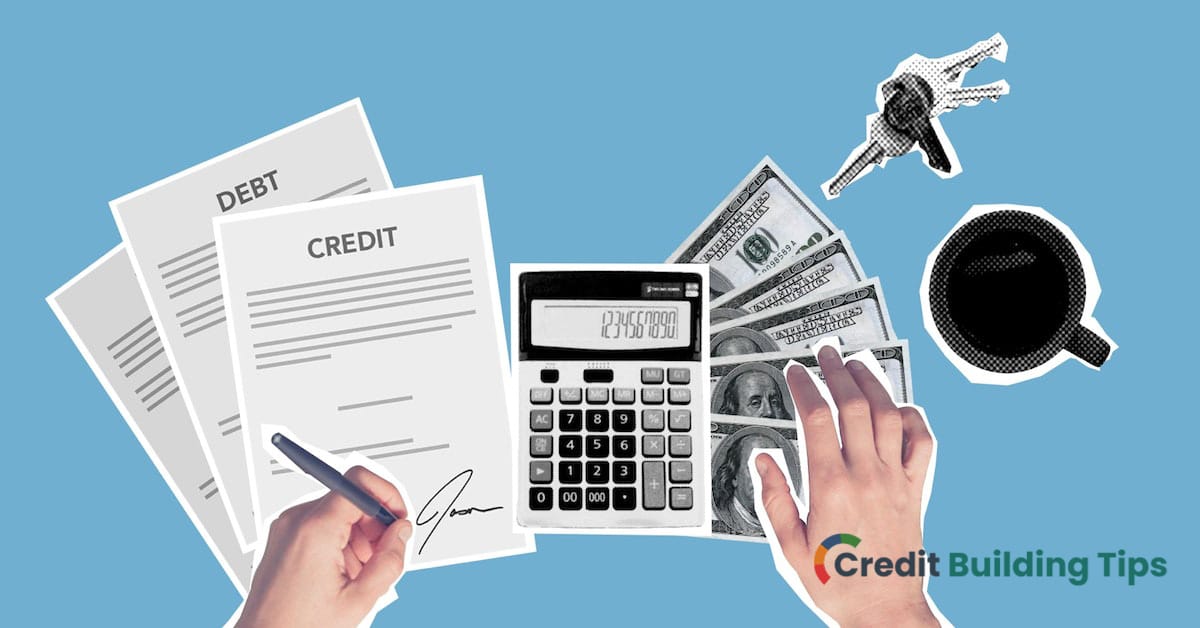
Obtaining a credit score of 700 or more isn't technically impossible with a collection account on your report, but it's also not common, particularly if the collection account is new. There are a number of factors that will influence how much of an impact a debt in collections will have on your credit score, including:
How much a collections account makes your credit score drop will depend on a number of factors, including those listed in the previous section. However, it's worth understanding that having a debt sent to collections could reduce your score by more than 100 points.
It might seem unfair, but the better your credit score was to start out with, the more a debt being sent to collections will hurt your score.
For example:
That being said, many debt collectors will wait a specific period of time before reporting to the credit reporting agencies. This means that if the collections account is new it may not have been reported to the credit bureaus yet.
It's not a guarantee that you'll be able to settle the debt before it ends up on your credit report. However, if you've just received your first notice, it could be worth trying to determine whether you can pay the debt and avoid the collection account showing up on your credit file.
When a collection account appears on your credit report, it means that you defaulted on a loan. Though some creditors have their own in-house collection departments that will try to recoup the money they lent you, many will charge off the account. The debt was either consigned or sold to a collection agency by the original creditor.
When a collection account is reported to the credit bureaus, it can stay on your report for seven years. Though practices can differ between creditors, unpaid debts are often sold to collections agencies when a debt goes unpaid for about six months.
The original creditor passes the debt to a third party in order to try and recoup as much of the debt as possible.
Leading up to a debt being sent to collections, you will have missed a certain number of payments on the debt. These will also show up on your credit report as derogatory marks.
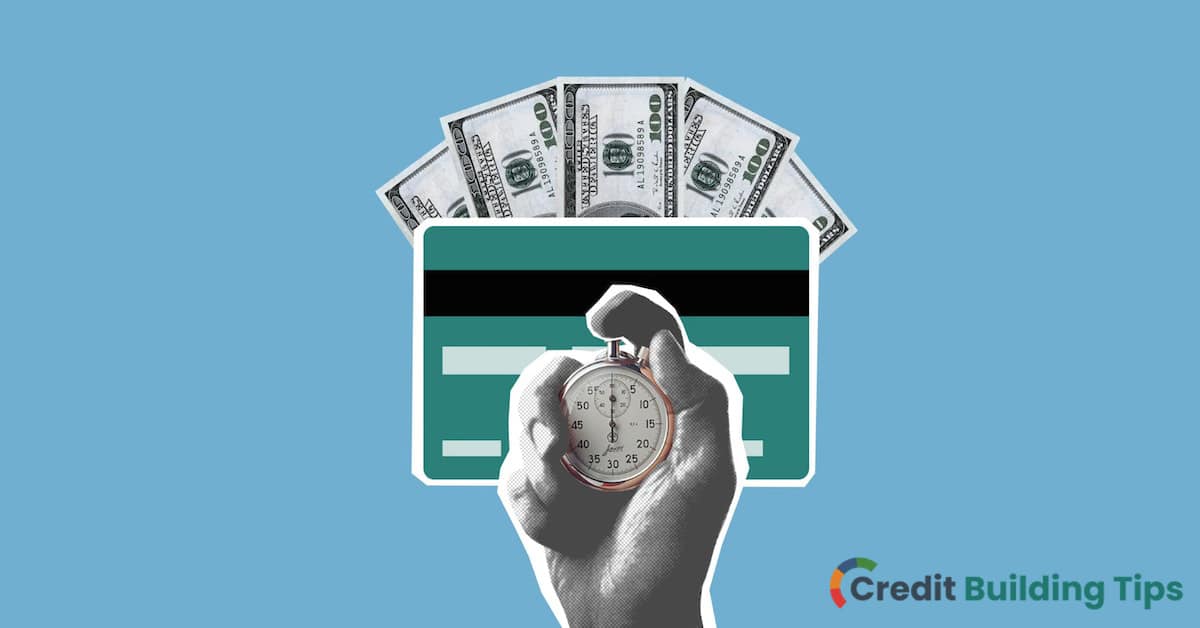
There are a number of different types of debt that can be sent to collections, including:
Both VantageScore and FICO credit scoring systems will take collection accounts into their calculations when determining your credit score.
A collections account is considered a part of your payment history, which is the category with the heaviest weight when it comes to your score. This means that an individual that has collections on their credit reports will most likely have less favorable credit scores when compared to individuals that don't have any accounts in collection.
Having a debt in collections will likely negatively impact your credit scores. Even paid collections can remain on your credit reports for seven years. However, the severity of the affect on your credit scores will diminish over time.
Having a collections account on your credit report won't just damage your scores, though-- it can also influence lender decisions down the road. If you're planning on applying for a mortgage, car loan, or credit card, that debt in collections might sully your chances. As an example, Fannie Mae will require applicants to pay off debts in collections before closing on a home loan in many instances.
We'll dive into this topic a little deeper in the next section.
Whether or not paying off your debts in collections will improve your credit score depends on the credit scoring model that is used to calculate your score.
For example, the newest FICO and VantageScore versions ignore collections that no longer carry a balance. This means that you might see an improvement in your VantageScore 3.0, VantageScore 4.0, and FICO 9 score after paying off debts in collection. However, if you are looking at a credit score that is calculated using an older model, paying a collections account won't improve your score.
You might assume that all creditors and lenders will use the latest models for calculating credit scores, but this actually isn't the case. For instance, mortgage lenders tend to use older credit scoring models, which will penalize you even for paid collections accounts.
If you're considering applying for a mortgage and you're wondering how your collection accounts will impact the score that lenders see, it's a good idea to check out your FICO 8 score. This will help you better understand the numbers a lender will encounter when looking at your credit score.
Though collections accounts aren't usually good news for your credit scores, the impact can depend on the type of account. In fact, some types of debt collection accounts might not have any effect on your credit score at all.
Collections accounts will stay on your credit report, in many cases, for seven years even after you've settled them or paid them in full.
Paid collections were used in older credit scoring models, but they no longer figure into the following versions of FICO and VantageScore:
While this might sound like good news, it's worth noting that not all lenders and creditors use the latest credit scoring models. In fact, accounting to Nerd Wallet, FICO 8, which does penalize paid collections accounts, is used in most credit decisions.
According to the Kaiser Family Foundation, there are more than 100 million Americans that are struggling to pay medical bills. In an attempt to give consumers a little bit more breathing room when it comes to repaying their debts, Experian, TransUnion, and Equifax have made big changes to their medical debt reporting policies.
These types of medical debts won't show up on your credit report anymore:
FICO 9 and VantageScore 3.0 and 4.0 also don't put as much weight on unpaid medical debts in a collection as they do on other types of debts in a collection.
While unpaid medical debt can still negatively influence your credit score, these changes can help reduce the impact of medical bills on many Americans' credit scores.
Also known as "nuisance" accounts, FICO Score 8 and later models don't incorporate small-dollar collections. Essentially, collections account for debts less than $100 won't factor into your score if you're using a more recent FICO scoring model.
Though FICO and VantageScore calculate credit scores in slightly different ways, there is a collection of factors that will impact your credit score using either model. As we look at how each score is calculated, you'll see a number of similarities between the two models.
There are five primary factors that go into calculating your FICO Score. As the most widely used and popular credit scoring model, it's worth watching your FICO Score.
The FICO credit scoring model is used in lending decisions more often than your VantageScore, so it's worth keeping tabs on your score and understanding how it is calculated.
The main factors that impact your FICO score are:
VantageScore uses similar but not identical categories to calculate credit scores. Starting with the most influential to the least influential, here are the factors:
Is 700 a good credit score? Is dropping below 700 a problem?
The answer depends on whether FICO or VantageScore calculates your credit score and which version of each model is used.
The base range for FICO Scores is 300 to 850.
Here is the breakdown from poor to exceptional:
There are a number of different types of consumer credit scores created by FICO, with the "base" score available as a standard for lenders in various industries to utilize.
On top of that, they also calculate industry-specific scores for auto lenders and credit card companies. For these industry-specific scores, the scores can range from 250-900. That being said, a "good" score for an industry-specific FICO score is still anywhere from 670-739.
This means that 700 is considered a "good" FICO credit score whether the base score is used or one of the industry-specific scores.
The first two credit scoring models VantageScore released ranged from 501 to 990. However, VantageScore 3.0 and 4.0-- the newest versions-- use the same range as the base FICO Scores.
Categories for VantageScore 3.0 and 4.0 are broken down in the following manner:
As you can see, 700 is also considered a "good" credit score when the VantageScore model is used.
Unlike FICO, VantageScore doesn't offer industry-specific scores.
Though it is possible in some circumstances to have a 700 credit score even when you have a debt in collections, it's not likely. Unless your collections account fits into one of the types described above that don't have as much (or any) impact on your credit, a collections account usually has a pretty big impact on your score.
Though this might be disheartening, it's important to remember that negative marks, like collections accounts, will diminish in their impact on your score over time. After seven years, it should fall off your report. Whether you try to remove the account from your credit report or wait for it to fall off, remember that its impact isn't permanent!
Additionally, there are things you can do to improve your credit even when you have some less-than-ideal marks on your credit report. If you're on a mission to improve your credit, make sure you head over to our Credit Building Tips blog for more resources.
When you search the question "Is Rocket Credit Scores legit" on Google, you end up with a lot of mixed results. Some forums report that this is undoubtedly a scam, while others state that it's a service offered by the legitimate company Rocket Money Inc.
So, which is it?
 It appears that there may have been a website-- www.rocketcreditscores.com-- that was used as a part of a potential scam. This site is no longer active, though. On the other hand, there is a real company called Rocket Money (owned by the same company as Rocket Mortgage) that offers a personal finance app. One of the features of this app is helping you keep track of your credit score.
It appears that there may have been a website-- www.rocketcreditscores.com-- that was used as a part of a potential scam. This site is no longer active, though. On the other hand, there is a real company called Rocket Money (owned by the same company as Rocket Mortgage) that offers a personal finance app. One of the features of this app is helping you keep track of your credit score.Let's take a look at what you should know about accessing your credit scores using Rocket Money's service.
When you search for 'Rocket Credit Scores' using a search engine, you'll find all kinds of disconcerting information.
On Reddit and other forums; you'll find posts from people regarding job and apartment applications where they are asked to fill out an application on RocketCreditScores.com.
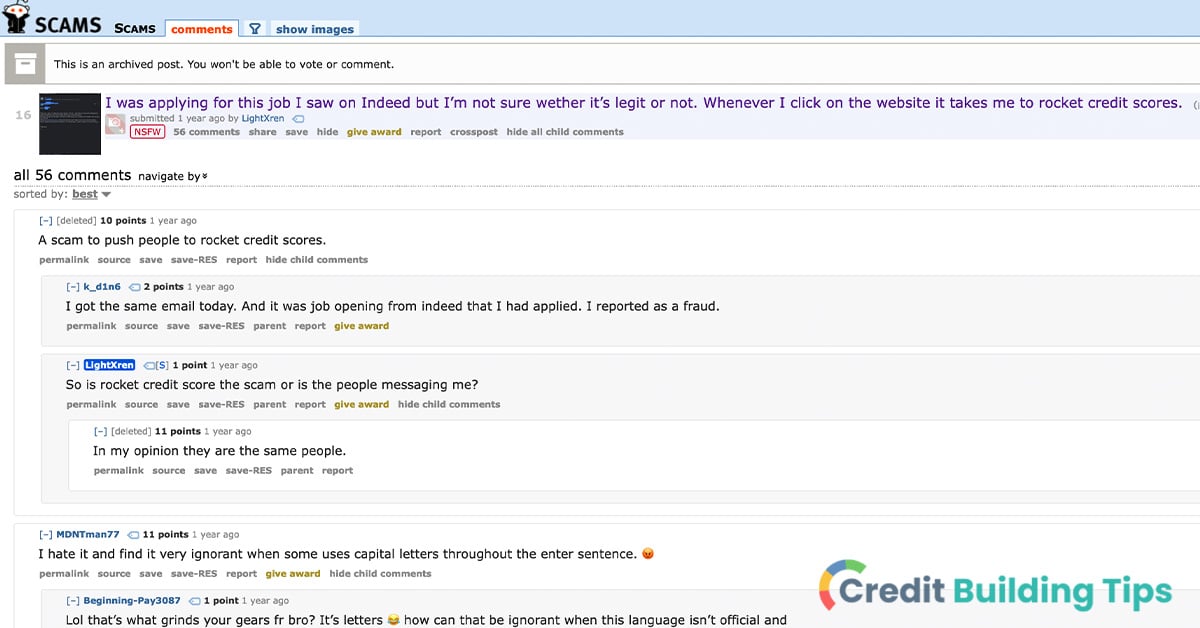
From the screenshots of the communications posted, it's clear that something fishy is going on. Littered with grammatical errors and spelling mistakes, scammers appear to have been posting too-good-to-be-true job posts, apartment listings, and houses for sale. They would then ask applicants to fill out an application that required them to pay one dollar, presumably allowing the scammers to access personal and financial information from unassuming individuals.
People who responded to the posts all made it very clear-- these types of listings are scams intending to steal people's sensitive information or money. They can use personal and financial information to commit credit card fraud or other forms of identity theft.
There have been Federal Trade Commission cases against individuals and companies running this type of scam. Schemers will advertise properties that they don't own and ask applicants to pay deposits, and direct them to credit score sites that they must pay for. While it isn't uncommon for landlords to run a background check and pull a credit report for potential tenants, you don't want to ever enter information into a site the landlord directs you to. You should also always be wary if they refuse to tell you the address of of the house or apartment.
If by 'Rocket Credit Scores' you mean www.rocketcreditscores.com, a link you've received in a suspicious email, the answer is no. This is not legit, and you shouldn't enter any personal information into this form. The job or apartment that is being advertised is almost certainly not real, and entering your information could result in identity theft and fraud.
On the other hand, if you're asking about the credit score monitoring service offered by Rocket Money, Inc., the answer is yes.
Whether or not this is the best way to monitor your credit is another question that we'll look at in the next few sections.
You're likely familiar with Rocket Mortgage, the largest non-bank mortgage lender in the United States.
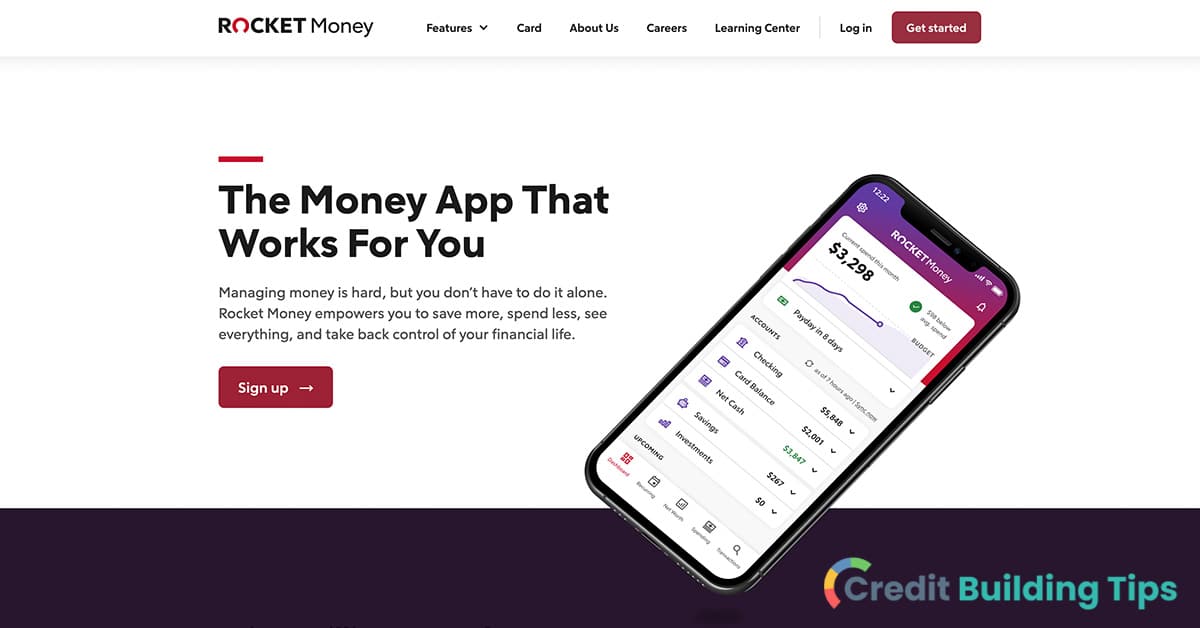
Though the company started off as just a mortgage lender, they've grown into an entire ecosystem of companies. With an umbrella company known as Rocket Companies, the following businesses are a part of the Rocket family:
So, the short answer is that Rocket Money is related to Rocket Mortgage but not a part of the same company. The easiest way to understand it is to say that they exist within the same ecosystem of businesses.
Now that we've gotten that out of the way, what exactly is Rocket Money?
Here are some of the advertised features of the app:
The Rocket Money app can be found on both the Apple store and the Google Play store. With 256-bit encryption storing data and securely linked accounts using Plaid, this is billed as a secure and safe personal finance app.
While the app is free, there is also a Premium plan. You can sign up for their seven-day free trial in order to test it out, but after that, it costs between $3 and $12 a month. This is a sliding scale payment model where you can pay what you believe to be fair, though you'll want to keep in mind that $3 and $4 plans require paying for a whole year rather than giving you the option to pay per month.
It's perfectly reasonable to want to make sure that the credit score you see will be accurate before signing up for a service.
The reality is, though, that you actually have several different credit scores. This means that, depending on the site or service you use to check in with your credit score, you might find that your score varies.
There are a number of different factors that influence potential variations in your scores, including:
Rocket Money uses your Experian credit report and the VantageScore 3.0 scoring model in order to calculate your credit score.
As a counter-example, another popular site-- Credit Karma-- will offer your VantageScore 3.0, but based on your Equifax and TransUnion credit reports. If you use the free credit score service offered by Experian, they use your Experian credit report and calculate your score based on FICO Score 8 model.
This means that your score can come back slightly different from different services depending on the scoring model and credit reports information is being pulled from.
The answer to this question is going to depend on what you're looking for. There are lots of companies that offer free credit score monitoring, including credit card issuers.
It's worth noting that your credit score and your credit report are two different things-- you won't find your credit score on your credit report.
To check your credit scores, you can look in a number of different places:
Rocket Money is really best for people that are interested in reducing spending and creating a budget. Other popular apps of this type include Mint and Simplifi. Probably the most notable feature that makes it stand out from other apps and service is its bill negotiation feature. (For the record, Mint does now offer a bill negotiation feature in partnership with Billshark.)
Using this feature, you can upload a copy of your bill, and Rocket Money will let you know if they think you can get a better price. With the Premium Plan, they can also try to recoup bank fees.
Beyond that, though, Rocket Money isn't necessary just to have access to your credit score. If you're interested in the app because of its additional features, though, the fact that it also gives you your credit score in the same place is convenient.
The benefits of using the Rocket Money app include the following:
On the other hand, some of the drawbacks include:
Before I sign off, let's take a look at some of the most commonly asked questions about Rocket Credit Scores, the Rocket Money app, and credit score scams.
To access a number of the most appealing features offered by Rocket Money, you have to buy the Premium Plan. There is, however, a seven-day trial you can sign up for to determine whether it's the right thing for you.
The cost operates on a sliding scale, with costs ranging from $3 a month to $12 a month. On the lower end of the scale, you have to pay for a full year at once rather than paying a month at a time.
Yes, the app formerly known as TrueBill is now called Rocket Money. Truebill announced the name change in June 2022. It had previously already become a part of Rocket Companies in late 2021.
As receiving a free credit score from legitimate online services like Credit Karma, Credit Sesame, and Rocket Money becomes more common, so do credit score scams.
To protect your personal and financial information, make sure to follow the following tips:
If you've been directed to www.rocketcreditscores.com in response to a rental, real estate, or employment inquiry, it's best to stay away. It appears that this site may have been used as a part of a scam to obtain people's personal and financial information.
On the other hand, if you're wondering if the Rocket Money app is a safe way to monitor your credit score, the answer is yes. Of course, you're always taking some risks when using digital tools to track your financial information because of the risk of data breaches and so on. That being said, the Rocket Money app is released by a legitimate, reputable company.
Keeping an eye out for potential scams is absolutely essential in this day and age. Scammers and fraudsters are becoming increasingly sophisticated in their tactics. Having someone steal your identity can wreak havoc on your finances and credit report, so it's important always to be wary of sites that are asking for private, sensitive information.
Whether you're rebuilding your credit after being the victim of identity theft or you're on a mission to boost your credit score, you're in the right place. Be sure to check out our Credit Building Tips blog for more valuable resources.
Pawnshop loans can be an intriguing option for people looking to come up with cash quickly or with less-than-ideal credit.
If you take out a pawnshop loan, though, will it hurt your credit score? Will your credit be damaged if you don't pay a pawn shop loan back?
 While there are definitely some reasons to be wary of pawn shop loans, one good thing about them is that they won't hurt your credit score. Pawnbrokers won't report your payment history to the credit bureaus, and the loan won't appear on your credit report.
While there are definitely some reasons to be wary of pawn shop loans, one good thing about them is that they won't hurt your credit score. Pawnbrokers won't report your payment history to the credit bureaus, and the loan won't appear on your credit report.Before you grab your grandmother's antique jewelry or your flat-screen TV and start driving to the local pawn shop, you'll want to learn a little bit more about these loans and explore some of your other options.
Also known as a pawnbroker loan, a pawnshop loan is a type of secured, short-term loan. These can be obtained either at brick-and-mortar pawn shops or online pawn shops.
A secured loan is a type of loan where the debt is backed by collateral. In the case of a pawn shop loan, the asset backing the loan is the item of value you leave with the pawnbroker.
If you agree to the loan, you'll leave the item with the pawnbroker. The catch is that they can keep and resell your item if you don't pay the loan back within the time period that was agreed upon.
Pawnshop owners will typically offer a loan that is somewhere between 25% and 60% of the estimated resale value of the item. This will usually be a lot lower than the price you originally purchased the item for.
Not only do pawn shop loans put you at risk of losing a potentially valuable and maybe even sentimental item if you aren't able to repay the loan, but it's also important to note that this type of loan isn't usually very cheap.
Before taking out a loan like this, it's a good idea to assess your other options and make sure you're not going to end up in a worse financial position than where you started.
Though there are definitely some pros and cons to weigh out when it comes to taking out a pawnshop loan (which we'll take a closer look at in the next section,) one advantage is that it won't hurt your credit score.
When you take out a pawnshop loan, your payment history won't be reported to the credit bureaus by the pawnbroker. This means that whether or not you repay the loan won't have any impact on your credit. At the same time, making timely payments toward a pawnshop loan won't help you rebuild your credit.
If you're hoping that all of your pawnshop loan repayments will help you improve your credit score, you're, unfortunately, out of luck. On the other hand, if you're worried that your pawn shop loan is going to ding your credit, you'll be glad to know that pawn shop loans won't end up on your credit report.
Beyond that, pawn shop loans won't end up with you being harassed by debt collectors if you fail to pay them back. If you don't pay back the loan within the stated period of time, the pawnbroker will keep the item that you left as collateral and resell it.
Is it a good idea to borrow money using a pawnshop loan? While there are definitely some appealing things about these loans, including the fact that they don't impact your credit score and you can get cash quickly, there are also a number of drawbacks to consider.
Pawn shop loans can be attractive when you don't have great credit and when you're looking to get a quick loan.

Here are some of the ways that pawnshop loans can be beneficial to borrowers:
On the other hand, borrowing money from a pawnshop can be risky in a number of ways.
Here are some of the negative aspects you'll want to keep in mind before pawning your valuables for a loan:
If you need quick access to cash, but you're worried about the risks of taking out a pawnshop loan, there are other options that you can look into. You'll notice that we don't include high-interest payday loans or title loans on this list-- both of these loan types come with high costs and high risks that make them generally a bad idea.
What are some alternatives to pawnshop loans when it comes to borrowing money? Here are some other options to keep in mind.
If you have a credit card with a credit available, you can either use the card to make a purchase or even consider a cash advance. However, you'll want to look at the interest rate for cash advances, as the interest rates are often higher than for standard purchases.

That being said, the APR for a purchase or cash advance using a credit card will most likely be significantly lower than the APR you would receive if you took out a pawnshop loan. Of course, you don't want to spend money that you don't think you'll be able to pay back, as this can continue the cycle of debt.
If you have decent credit, you also might be able to qualify for a promotional 0% APR credit card. This means that you won't have to pay interest for a set period of time.
A number of big banks and online lenders will offer small-dollar loans to existing customers.
These are short-term loans that will have much more favorable interest rates than pawnshop loans. These do, however, usually require a credit check.
Personal loans are typically unsecured loans, meaning that you don't have to put down collateral. Even though the interest rates for personal loans are higher than many types of secured loans (auto loans, home loans, etc.), they will usually be lower than the APR you'd find at a pawn shop.
Even if you have bad credit, you might be able to find a lender that offers loans specifically for people in your situation. Additionally, some offer emergency loans. It's always important to check out the terms of a loan before signing on and shop around to compare interest rates and terms.
Payday loans are an incredibly expensive way to borrow money. On the other hand, payday alternative loans (PALs) have a lower interest rate. These are offered by federal credit unions specifically as an alternative that is more affordable to payday loans.
Another option is an online lending platform. The rates and terms can vary quite a bit, but the credit requirements might not be as strict as they are for a more standard personal loan.
There might be local nonprofits, religious groups, or organizations in your community that offer help to people that are dealing with short-term financial problems. There are also a number of federal, state, and local programs that out there to help people with utilities, groceries, medical bills, and other essential expenses.
Though it can be hard to ask someone close to you for financial help, this can help you avoid costly interest charges and other fees. Mixing personal relationships and money can be tricky, so it's important to come up with a clear agreement about how and when the money will be repaid.
Wondering how else you can come up with cash quickly without getting a loan? Here are some ideas to consider.
The same item you're thinking about pawning could be better put to use by simply selling it yourself. If you're ready to let go of some of your valuable items and you want to turn them into cash, consider selling them through platforms like Craigslist, eBay, or Facebook Marketplace.
There are a lot of side gigs out there you can pick up quickly, such as food delivery, ride-sharing, online tutoring, babysitting, pet sitting, or part-time freelance work. A little bit can go a long way when you're trying to get out of a financial rut, and a side gig might be just what you need.
If you simply need a little extra cash to get through to next week, you might be able to ask your boss or HR department if you can get an advance on your paycheck. This isn't something you want to do all the time, but as a one-time thing, your company might be understanding and willing to help you out.
There are a number of apps that you can use to receive an advance on your paycheck if you'd rather not ask your boss for a favor. When searching for a cash-advance app, make sure you take a close look at the interest and fees charged.
Have an extra room in your home that you don't use? You might consider renting it out short-term using a service like Airbnb or long-term and taking on a new roommate. There are obviously pros and cons to these options, but it's worth considering if you're strapped for cash.
Even if you don't have anything of value that you want to sell, you might be able to find items on sites like Craigslist or Facebook Marketplace that you can clean up and flip for a profit. You can also check out thrift stores, estate sales, and free piles.
If you live near a college or university, it's possible they offer paid research studies that you could participate in. There are almost always parameters you have to meet to participate, and some will pay in gift cards rather than cash. According to Miami Clinical Research, most studies pay between $50 and $300 per day.
Have a big jar of coins sitting on your dresser? If you're coming up short this week, you might be surprised how much cash is hidden in that jar. You're not going to find enough to buy a new car, but you might be able to scrounge together some extra cash to put toward your bills or buy some groceries.
If you're considering a pawnshop loan because you're having a hard time paying your bills, here are a few more things you might consider:
If your credit has seen better days, all hope isn't lost. You can rebuild! Check out our guides to credit repair hacks, removing derogatory marks, and removing evictions, late payments, collections, and hard inquiries from your credit report.
Finally, let's answer a few other common questions about pawn shop loans.
To get a pawn shop loan you'll need to show proof of your identity and be 18 years old or older. Sometimes you'll also need proof of ownership or purchase of the item. No credit check is required.
Though there are rules at both the federal and state level that regulate pawnshops, that doesn't mean that all pawnshop owners are following the rules. It's possible that a pawnbroker could charge a higher APR than what is technically allowed by the state or otherwise engage in predatory lending practices.
There have been a number of lawsuits filed against specific pawn shops by the Consumer Financial Protection Bureau (CFPB) due to their illegal practices.
Taking out a pawnshop loan certainly comes with its fair share of risks, including losing the item you put up as collateral, paying high-interest rates and fees, and even the potential to be a victim of predatory lending. At the same time, pawnshop loans are typically considered a less harmful way to borrow money compared to other options like payday loans or auto title loans.
If you don't repay a pawnshop loan, you'll lose the item, as the pawnbroker will resell it. You won't get the money back that you put toward the loan, and you won't receive any of the profit the pawnbroker made when they sold it.
If you repay a pawnshop loan within the time specified in the loan terms, you can retrieve the item you put up as collateral. There are often options for extending loans at pawnshops, but you'll have to pay additional interest and probably storage fees, too.
According to data from the National Pawnbrokers Association, the average size of a loan received from a pawnshop in the U.S. is $150. Some shops might have set minimums and maximums for loans, and some states might regulate how much money a pawn shop can loan out and the length of the loan term.
The terms for pawn shop loans can vary quite a bit, though they typically involve a high-interest rate. In a number of states, legislators have stepped in to try and regulate pawnshop loans. This means that some states will have laws that will dictate how long you can take to pay back a pawnshop loan.
For example:
Interest rates for pawnshop loans are commonly between 5% and 25% a month, typically closer to the 20% to 25% range. There are also sometimes additional fees for storage, insurance, and other costs. This makes it a costly way to borrow money.
You can pawn just about anything at a pawnshop that has value. At the same time, not all pawnshops will accept specific items as collateral for a loan.
Some of the most popular pawned items include:
Running out to the pawn shop (or finding one online) to take out a loan might not be the absolute worst way to borrow money, but it really isn't the best, either. Though a pawn shop loan won't harm your credit score, it's definitely an expensive way to borrow money and comes with a number of unpleasant risks.
Luckily, there are a number of other things you can do if you need quick access to cash, are having trouble paying your bills, or are trying to borrow money with poor credit.
Though you might have short-term financial woes right now, it's a good idea to start thinking about the big picture. With some attention and dedication, you can work to rebuild your credit over time so that funds are much easier to obtain the next time you need to borrow money.
Is it time for you to start working on your credit to help you gain access to better financial opportunities? If so, make sure you check out our Credit Building Tips blog.
There are few things more unnerving than realizing that someone has stolen your credit card or your financial information. If someone committed credit card fraud using your card number or info, what happens to them?
Is credit card fraud a felony? What punishment does a fraudster receive?
 Credit card fraud is a serious crime, but whether or not an individual is charged with a felony or a misdemeanor will first depend on where the crime was committed and whether the crime is being prosecuted at the state or federal level. Though punishments can vary depending on the jurisdiction, punishments can include lengthy jail time and hefty fines.
Credit card fraud is a serious crime, but whether or not an individual is charged with a felony or a misdemeanor will first depend on where the crime was committed and whether the crime is being prosecuted at the state or federal level. Though punishments can vary depending on the jurisdiction, punishments can include lengthy jail time and hefty fines.If someone stole your credit card and racked up charges, it's natural to want to know what will happen to them. Let's take a look at what you need to know about the credit card fraud laws in the United States at both the federal and state levels.
When a person takes information from another individual's credit card or debit card with the intent to remove funds or charge purchases to the card, it is considered a form of identity theft.
There are a number of ways that an identity thief can obtain information from a credit card, including:

There are a few different ways that credit card fraud can be committed. Some common examples include:
Fraudsters use a wide variety of scams to open new accounts in someone else's name or to get card info illicitly.
Here are some common fraud methods:
Has your credit report seen better days? Start cleaning it up with the help of our guides to removing late payments, evictions, charge offs, collections, and hard inquiries.
There are laws at both the state and federal levels addressing the rising threat of credit card fraud and debit card fraud. Whether or not credit card fraud is considered a felony or a misdemeanor depends on a number of different factors. Still, it is primarily determined by the laws in the jurisdiction where the fraud is committed.
Some factors that can influence whether this type of fraud is considered a felony at the state level include:
The laws regarding credit card fraud at the federal level focus on commerce that occurs between states or internationally. Using a credit or debit card that is stolen or was obtained fraudulently is a federal crime.

Most credit card fraud cases are prosecuted at the state level. However, under 18 U.S.C. § 1029, they can also be charged as a federal crime. At the federal level, credit card fraud is often referred to as access device fraud.
It is a felony at the federal level to use, produce, or traffic in "unauthorized access devices" or "counterfeit access devices." Access devices are any tool that are used to gain access to another individuals personal information or financial accounts and include credit cards, gift cards, and debit cards.
Federal credit card fraud might sound like something only big-wig criminals are guilty of, but it's actually not as complex as you might think. If someone uses another individual's credit card to purchase something online or uses someone else's card that was issued in a different state, it becomes a federal crime.
It's also worth noting that someone who has committed credit card fraud at the federal level could also be charged with a number of other related federal crimes, including:
Credit card fraud laws in every state in the U.S. make it illegal to possess and use a credit card illegally. If you're interested in learning the laws in your state, you'll want to look at the specific statutes on the books.
Let's look at a few U.S. states' credit card fraud laws.
As an example, let's look at the credit card fraud laws in Texas, the second most populous state in the country.
In the next section, we'll look at what the punishment is for committing this crime in Texas.
Looking at the laws in Ohio regarding credit card fraud, we see that credit card fraud is a 1st-degree misdemeanor if the total value of the property, services, and debt is less than $1,000.
First and second offenses for credit card fraud in Florida, so long as the amount is $100 or less, is considered a misdemeanor. Any fraud involving a value of more than $100 is considered a felony, as well as third offenses of any amount.
Using a revoked or canceled credit card knowingly is considered a misdemeanor in New York. However, it's a felony to be in possession of a stolen card.
The state of California typically prosecutes credit card fraud as theft. Whether the charge against the fraudster is a misdemeanor or a felony has to do with how severe the crime was.
Ready to rebuild your credit? Take a look at our list of credit score hacks and our guide to removing derogatory marks from your credit report.
What type of punishment does a credit card fraudster receive? Though it can vary depending on a number of factors, the consequences of this type of crime can be as severe as serving substantial time in prison and large fines.
People that are convicted under the federal statute for access device fraud, which includes credit card fraud, can face up to 10-20 years in prison. Beyond that, they can also be required to forfeit items or money that they acquired illegally and pay a fine of up to $250,000. Restitution is also a possible outcome of credit card fraud at the federal level.
Being found guilty of related crimes such as mail fraud, financial institution fraud, computer fraud, or wire fraud can result in up to thirty years in prison.
The punishments for credit card fraud at the state level are going to vary depending on the state where the crime was committed and is being prosecuted.
Earlier in the article, we discussed the Texas laws regarding credit card fraud and the fact that they are all charged as felonies.
Here are the potential punishments for committing credit card fraud in Texas:
In California, penalties range from spending six months in jail and paying a $1,000 fine to being sentenced to three years in prison. The criminal can also be ordered to pay restitution.
The state of Florida offers severe punishments to credit card fraudsters as they are often classified as third-degree felonies unless the value is less than $100 and it is only a first or second offense. This can result in up to five years in prison and up to $5,000 in fines. For crimes that exceed $300 or involve more than one victim, criminals can be given up to fifteen years in prison and up to $10,000 in fines.
According to the Federal Trade Commission, credit card fraud has been the most common type of identity theft since 2017, except for a couple of months when there was a rise in unemployment benefits and relief program fraud during the height of the pandemic.
A survey released by the Federal Reserve helps to give more clarity to the scope of credit card fraud in the US, with the Survey of Consumer Payment Choice finding that 3.5% of credit card holders stated that they experienced theft, loss, or fraud related to a credit card in the previous year. The percentage of people that report this type of issue varies a bit from year to year, but the average is roughly 4.7%.
Another survey conducted by Security.org discovered that 58% of respondents had, at some point in their lives, experienced credit card fraud. For 9% of these respondents they had dealt with credit card fraud four or more times.
As you can see, credit card fraud is not, by any means, rare, and you certainly shouldn't assume that it just won't happen to you.
What can you do to keep yourself safe from credit card fraud?
Here are some tips:
If you think someone has been fraudulently using your credit card information, what should you do?
Here are some steps you can take:
Credit card theft isn't always considered a felony, but it is pretty much always treated as a serious crime. Whether it occurs at the federal level or the state level, knowingly using someone else's credit card information can result in lengthy prison or jail sentences as well as large fines.
If you are curious to know what the laws are in your state, you'll want to take a closer look at your state's penal codes. These will outline how fraud is defined, what constitutes each level of misdemeanor and felony, if applicable, and the potential punishments for individuals found guilty.
Dealing with credit card fraud can be truly overwhelming. Still, it's important to know that there are steps you can take when you discover fraud, ways to protect yourself in the future, and strategies you can use to clean up your credit so you can increase your access to financial opportunities down the road.
Are you on a quest to improve your credit? If so, make sure you check out our Credit Building Tips blog for more valuable resources.
Most of us are happy when our credit cards offer us some cash back rewards or airline miles. For the lucky few that are in possession of the hardest credit card to obtain in the world, though, the perks go far beyond these basic benefits.
The average Joe or Jane isn't going to be able to even apply for one of the most exclusive credit cards, though. These are typically invite-only and are reserved for the planet's most affluent individuals.
 There are several cards in the running for being the most difficult to obtain-- including the Amex Centurion Card, the Dubai First Royal MasterCard, the Stratus Rewards Visa White Card, and the Coutts World Silk Card.
There are several cards in the running for being the most difficult to obtain-- including the Amex Centurion Card, the Dubai First Royal MasterCard, the Stratus Rewards Visa White Card, and the Coutts World Silk Card.Are you curious about how the other half lives? If so, stick with me while I take us on a journey through the luxurious perks of the world's most prestigious credit cards.
It's hard to pin down precisely which card is the hardest to get in the world. That doesn't mean, though, that there isn't impressive competition for the title.
One reason it's hard to pick one card as the most difficult to obtain is that the card issuers are very tight-lipped about the qualifications for these status symbols. Instead, curious consumers have to rely on rumors in many cases to learn what is required to have one of these exclusive cards in their wallets.
Let's take a look at some of the contenders when it comes to the hardest credit card to get in the entire world.
If the Centurion Card doesn't sound familiar to you, maybe you've heard of this exclusive American Express charge card by its colloquial name-- the Black Card.
Reserved for only the wealthiest clients of Amex. In order to qualify, individuals must have a certain network and credit quality. Beyond that, they have to have met certain spending criteria on the Platinum Card, which is considered its gateway card.
Minted out of anodized titanium, accented with stainless steel, and laser-engraved, this card weighs about half an ounce. With its distinctive black color, this card is recognizable around the world.
Considering this is one of the most exclusive cards in the world, it should come as no surprise that there's no easy way to apply. Though the requirements for receiving a private invite for this card aren't officially released by Amex, the rumor is that you will need to spend and pay off a certain amount of money across all Amex accounts in one year-- potentially as much as $350k and $500k.
Joining this exclusive club isn't free either-- there's an initiation fee of $10k, and the annual fee will run you $5k.
Are you on a mission to improve your credit so you can qualify for credit cards with better interest rates, better terms, and better perks? Take a look at our guides to credit repair hacks and removing derogatory marks from your credit report.
Though the Black Card (aka the Centurion Card) is definitely a major status symbol, it also offers some serious benefits:

Looking for an American Express card that's a bit more accessible to a regular Joe? Check out our guide to the easiest Amex card to get.
Some of the biggest named celebrities carry around a Black Card in their wallet.
They include:
Another contender for the title of the hardest credit card to get is the JP Morgan Reserve Credit Card. This is another invite-only card, you'll need to already be a J.P. Morgan Private Bank member in order to be considered.
Once known as the Chase Palladium Card, the card is made out of palladium, a rare chemical element.
The JP Morgan Reserve Card's annual fee sounds like a steal compared to the cost of some of the other cards on this list-- only $595 a year.
What can you expect once you're invited into this exclusive club and receive your card?
The perks associated with this card aren't actually that incredible when you consider that many of them are very similar to a much more accessible card: the Chase Sapphire Reserve.
In this way, you could say that this card is more of a status symbol than anything else.
That being said, cardholders enjoy the following perks:
It's hard to say which credit card is the most selective, but the Dubai First Royale Card is definitely in the running. This is another invite-only card, and Dubai First will literally scout out potential clients. You probably shouldn't hold your breath waiting for an invite, though-- most cardholders are members of the Saudi or Dubai royal families or at least have an exorbitantly high net worth.

According to a 2011 statement from the senior vice president of Dubai First, there are only a few hundred cardholders in the entire world.
Made with gold edges and a white diamond, this card has no purchase restrictions or credit limits. If you find yourself one of the lucky few that have this card in hand, you won't have to worry about the embarrassment of your gold-and-diamond card being declined at checkout.
Some of the benefits of this outrageously hard-to-get card include the following:
If you need any convincing that the Coutts Silk Card is exclusive, you'll likely be persuaded by the fact that the British Royal family are known to be cardholders. Offering both charge cards and credit cards, this is considered one of the hardest cards to get in the world.
In order to be considered for this card, individuals must already be Coutts clients. Though companies are famous for being tight-lipped about the requirements for these elite cards, rumor has it that potential cardholders need to have the ability to deposit something around one million pounds into their account.
Only the wealthiest clients have access to this card, which comes with a number of perks:
Searching for more information about credit cards? Check out our guides to CareCredit credit cards, what happens if a credit card is closed with a balance, guaranteed approval credit cards, and credit card nicknames.
When you hear the term "gold card," you probably think of a gold colored card that's supposed to help regular old consumers feel kind of fancy. This isn't the case with the Sberbank Visa Infinite Gold Card-- this card that is only offered to Sberbank's top clients is said to be made of pure gold. If that isn't enough, it also has twenty-six diamonds and a mother of pearl.
Getting this card will cost cardholders $100,000-- while $35k gets credited to the client's account, the other $65k goes toward actually making the card. Oh, and there's a $2k annual fee on top of that.
Some of the perks of this card include:
Not quite ready to apply for one of the most exclusive credit cards in the entire world? No problem. If you're looking for something a little more accessible, check out our post about the best department store credit cards for bad credit.
You may have heard this card referred to as "The White Card." Incredibly exclusive, there is very little public information about this card beyond the $1.5k annual fee.
In order to get one of these exclusive cards, you have to be either:
Wealthy cardholders can enjoy the following benefits:
If you're chomping at the bit to get your hands on the Amex Centurion, Dubai First Royale Card, or another one of the hardest credit cards to get, you likely have a long road ahead of you unless you're already a multimillionaire.
At the same time, the journey of a thousand miles starts with a single step! If you're ready to build wealth and ensure that you have access to the best financial opportunities out there, one of your first tasks is going to be to check in on your credit report and score.
If your credit score has seen better days, don't fret! With some time and dedication, you can clean up your credit report and increase your credit score so you start qualifying for better cards with more impressive rates, terms, and, of course, perks!
Are you ready to begin your journey to a better financial life? If so, head over to our Credit Building Tips blog for tons of resources to help you along the way.
Did you open a new credit account only to find that your new Capital One credit card is restricted?
There are a number of reasons this could have occurred, and in many cases, there are easy steps you can take to ensure you can use your card.
 Your Capital One credit card might be restricted because you haven't yet activated it, or it could be due to late payments, going over the credit limit, or suspicious activity.
Your Capital One credit card might be restricted because you haven't yet activated it, or it could be due to late payments, going over the credit limit, or suspicious activity.Let's take a closer look at the reasons why your card might be restricted and some common solutions that could help you regain access to your credit account.
Getting a new credit card can be exciting, but seeing that your card is restricted can be quite concerning. When it says that your account is restricted it means that it is suspended.
Before you start to panic, it's important to recognize that a suspended or restricted account doesn't mean that your account is closed. It just means that you won't be able to use the card or account until the restriction is lifted.
Are you thinking about applying for a new credit card? Make sure you look at our posts about getting a credit card before applying for a home loan and how a new card impacts your credit score.
Credit card restriction or suspension isn't something that just happens with Capital One cards. It can happen with any credit card issuer.
Some of the most common reasons for a restricted card include:
If you haven't used your card at all yet, though, none of these should apply to you. In that case, it might be that your account isn't yet activated or that there is a technical problem happening on Capital One's side of things.
If your Capital One card is brand new and your account is restricted, there's a good chance that this is simply because your card is new.

Capital One can restrict accounts until new credit cards are activated as a way to protect your account from fraudulent activity. For example, if someone else got a hold of the card Capital One sent you in the mail, without restricting your account it's possible that an identity thief could start making charges to your account.
If you just recently received your Capital One credit card and you haven't yet activated it, there's a good chance that activating the card will remove the restricted status from your account. If you activate the card and it is still restricted, you'll want to contact Capital One customer service.
Another possible explanation for a new Capital One card that is restricted could be that Capital One is dealing with a system error or a network outage. If you are sure that your account is in good standing and that there shouldn't be any signs of suspicious activity, there's a chance it's just a problem on Capital One's end.
Before trying to troubleshoot other issues, you can give Capital One a call and try and determine if they are dealing with technical problems. It's possible that solving the problem is just a matter of waiting for them to resolve the issue.
Is Capital One showing up on your credit report and you're not sure why? Check out our guide to what COAF means on your credit report.
If you've been using your new card for some time and all of a sudden, your account is restricted, another possible explanation is that Capital One has flagged purchases that they find suspicious. Suspicious activity can include purchasing activity that isn't in sync with your normal spending patterns.
For example, if there are several unusual transactions on your account in a short period of time, a very high-dollar amount purchase, or a purchase overseas, Capital One might restrict your account out of concern that your credit card information has been obtained by a fraudster.
If you're traveling abroad and your card is restricted all of a sudden, it might be that Capital One is concerned that someone has gained possession of your card or your information. You'll want to contact them to let them know that you're traveling and that the purchases are being made by you so you can regain access to your account. A particularly prudent move would be to call them before you leave town so you can give them a head's up that you'll be traveling.
Have you missed payments, made late payments, or gone way over the credit limit of your new card since you've been using it? If so, it's possible that these repeated violations of the credit card's terms have resulted in your account being restricted.
There are a number of different ways you can violate the terms of your agreement, but regardless of the cause, you'll want to try and determine the specific cause and rectify it right away. If you've missed a bunch of payments, for example, Capital One could eventually charge off your account. This means that the account is closed and passed off to a debt collector, both of which are going to be harmful to your credit.
When it comes to spending more money than your credit limit, it's worth noting that many card issuers will let you spend a certain amount more than your limit and maybe charge you a fee when this occurs. If you do this over and over again, they might restrict your account.
Have you been dealing with financial problems that led to less than ideal credit? Start cleaning up your credit report with our guides to removing collections, evictions, hard inquiries, and charge offs from your credit report.
Whether or not you can reactivate a restricted card or a suspended card depends on the credit card company, the circumstances that led to the restriction or suspension, and other factors.
You might want to take a look at your credit report to take a look at the status of your account and what's been reported. You can receive free copies of your credit reports through AnnualCreditReport.com, which is the site created by Experian, Equifax, and TransUnion and authorized by Federal law.
What should you do if your account is restricted? Here are the steps you'll want to take.
If your card is literally brand new and you haven't used it yet or even activated it, try to activate your card using the information on the sticker on your card. If you haven't received your card yet, you'll need to wait until you receive it to activate it. After all, you wouldn't want your activated card out there in the mail before it's in your possession.
If your card is already activated or activating it doesn't seem to help, the next step is to call Capital One customer service.
The customer service number for Capital One is 1-800-CAPITAL (1-800-227-4825). A representative will be able to inform you as to why your account has a restricted status and what steps you need to take to remove the restriction.
Once you give the customer service agent your information and verify your identity, they will be able to give you more information about your specific account. Make sure you confirm with them the actions you'll need to take in order to have your account restored before getting off the phone.
For example, if the restriction is due to having a balance that is over the credit limit, they might state that you need to pay off enough of the card so that what you owe is less than your total credit limit. Once you do that, your account will likely no longer be restricted.
If the restriction was caused by late payments, you might be able to make a specific minimum payment in order to have the restriction removed. No matter what the reason behind the restriction is, ask the representative about the time frame regarding when your account will be back to normal.
Dealing with a restricted card can be pretty frustrating, particularly if you're trying to make a purchase. Luckily, there are a number of things you can do to reduce the likelihood of ever having to deal with an account restriction.
If you end up spending more money than you are allowed via your credit limit, it could result in your account becoming restricted.

To avoid this outcome, make sure you regularly monitor your credit card spending as well as your balance. You can easily see how much money you have left before reaching your credit limit.
If you expect that you're going to need to spend more than the credit limit and you have had a good history with your issuer, you might consider asking for a credit limit increase. This can result in a slight ding to your credit if they run a hard inquiry to make sure you meet the standards. However, inquiries usually only negligibly impact your credit in the long run.
A number of credit card issuers offer fraud and security notification services. This means they will send you a notification or a message if any account activity comes across as suspicious.
Capital One and other card companies might restrict or suspend an account if they think it might be being used fraudulently. For example, if there are unusual purchases or large purchases made that are out of the ordinary for the account, they might freeze it to ensure no further fraudulent activity occurs.
Signing up for one of these services can help you know as soon as possible if Capital One thinks that activity on your account is suspicious. This can allow you to contact the card issuer and sort the situation out if it was, in fact, you who made the purchases. If it wasn't you, you'd want to know so that you can take the necessary steps to avoid further fraudulent activity.
If you miss too many payments, your Capital One account (or any other credit card account) could be permanently suspended.
It's essential to make payments on time if you're going to have credit cards, as missing payments can absolutely wreak havoc on your credit score. A certain number of missed payments in a row can result in your account being charged off and passed to a debt collector. To keep your credit report and score in good standing, make sure you're always keeping up with your payments.
Credit card companies might also restrict an account if purchases are all of a sudden being made in a different country than where you live or a place that is otherwise far from your home. This is a fraud prevention technique, but it can be frustrating and stressful if you're actually just on vacation trying to use your card.
Many credit card companies allow you to give travel notice using their website on mobile app if you're planning on taking a trip far from home. This can ensure your card won't be declined when you try to use it in a different state or country.
While you aren't required to tell your credit card company if you're traveling, it can help save you some hassle to alert your card issuer about your plans.
If you're traveling to a different city not terribly far from where you live, you probably don't need to set a travel notification with your issuer. However, if you're traveling out of the state or out of the country, there's a chance your card could be declined unless you let them know ahead of time.
You can also call up Capital One to let them know if you're planning on making an unusually large purchase. The same goes for any other card issuer-- Capital One isn't the only company that restricts accounts.
For example, maybe you have always only used your card to buy gas for your car. This month, though, you're planning on using it to buy new appliances for your kitchen, all on the same day.
Consider giving your credit card issuer a head's up when you're planning on making an unusually large purchase. This can help ensure that your card isn't restricted due to being flagged for suspicious activity.
When your account is restricted or suspended, it can be pretty inconvenient. At the same time, you might worry that it's going to destroy your credit score. Will it have any impact on your score?
The answer to this has to do with the reason for the restriction and whether or not you will be able to reopen your account. If your account is permanently suspended, there's a possibility this could lead to the account being closed completely.
Having a credit card account closed can impact your credit score in two primary ways:
Beyond that, if your account was restricted or suspended because you stacked up a number of late payments, it will also have a negative effect on your score. This is because payment history is a big part of your credit score. Additionally, any missed or late payments are going to show up as derogatory marks on your credit report for up to seven years.
All that being said, if your account wasn't restricted because of late payments or isn't going to be closed for good, a restricted card shouldn't hurt your credit.
Getting a new credit card only to find that it's restricted is pretty frustrating. If you've never used the card, it's possible that you just need to activate it. If you have used the card already, reasons for a restricted status include a balance that's over the credit limit, suspicious activity on your account, several late payments, or a technical problem on the part of Capital One.
Either way, though, the best course of action is to call the card company to try and figure out what's going on. There's a good chance there is a quick fix to the problem-- whether that's activating your account, paying down a high balance, or something else-- so that you can start using your card again.
Are you on a mission to improve your credit so you can have lots more financial opportunities in the future? If so, make sure you take a look at our Credit Building Tips blog for tons of resources that will help you get in great financial shape.